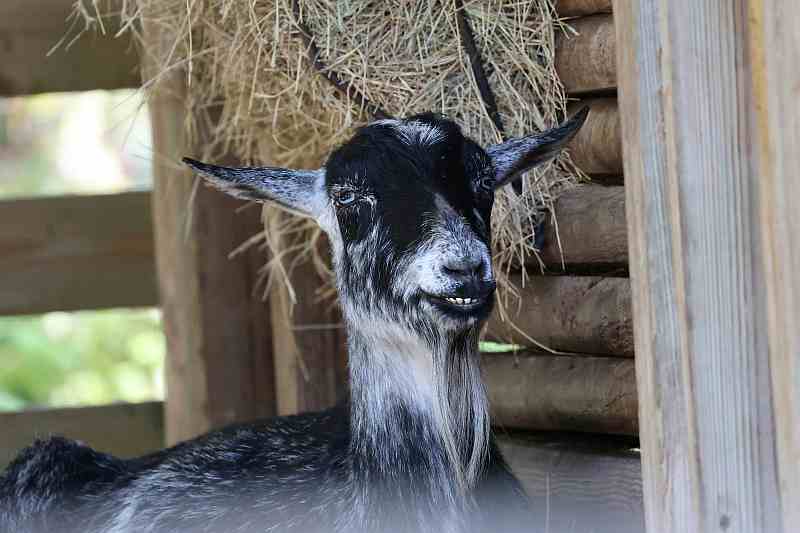Just as a child might yell out for attention in a crowded room, goats use their distinctive screams to communicate a variety of needs and emotions, from hunger to a simple desire for companionship.
You might have heard these intriguing cries and wondered what on earth could be causing such a stir. Whether it’s a call to their herd, an expression of discomfort, or a reaction to stress, each scream serves a purpose in the complex social structure of goats.
Stick around, and you’ll uncover not only why do goats scream but also what they could be trying to tell us.
Communicating With the Herd
Goats use vocalizations, including screaming, as a primary means of communicating with their herd. These signals ensure cohesion and alert others to potential dangers, and they play a critical role in maintaining the social structure within the group.
Specifically, mating calls and territorial disputes often trigger distinct screams, serving as an audible marker of individual needs and status within the herd. Mating calls, for instance, are used by males to attract females and may vary in intensity and frequency depending on the proximity and receptiveness of potential mates.
Similarly, goats emit loud screams during territorial disputes to assert dominance or defend resources. This complex system of vocalization allows goats to navigate their social environment effectively, reinforcing bonds and preventing conflicts within the herd.
Expressing Pain or Discomfort
Screaming also serves as an important indicator when a goat experiences pain or discomfort, signaling to the herd and caretakers alike that attention is needed. This vocalization can pinpoint health issues, such as internal injuries or illnesses, that may not be immediately visible.
For instance, a distinct change in a goat’s scream might suggest the onset of a specific health problem, urging prompt examination and intervention. Additionally, goats exhibit unique vocalizations related to mating rituals and potential discomfort or stress associated with breeding behavior during breeding seasons.
Analyzing these screams allows caretakers to assess the well-being of their goats effectively, ensuring any distress related to health issues or breeding processes is addressed promptly and appropriately.
Reacting to Hunger or Thirst
When hunger or thirst strikes, a goat’s vocal reaction often serves as a clear signal of its immediate needs, prompting caregivers to provide necessary sustenance. Understanding the importance of feeding routines and water accessibility is vital for maintaining the health and happiness of these animals.
| Aspect | Importance |
|---|---|
| Feeding Routines | Ensures nutritional needs are met |
| Water Accessibility | Prevents dehydration and promotes health |
Adhering to consistent feeding routines not only meets their nutritional requirements but also minimizes distress calls related to hunger. Similarly, ensuring easy access to clean water reduces instances of thirst-induced vocalizations. By analyzing these behaviors, caregivers can optimize care strategies, effectively addressing the basic needs of goats and thereby reducing instances of screaming related to hunger or thirst.
Seeking Attention
Just as humans do, goats often vocalize to capture the attention of their caregivers or fellow herd members, signaling a desire for social interaction or assistance. Their calls can range from soft murmurs to loud screams, depending on what they’re trying to communicate. This behavior is particularly noticeable in scenarios where they seek companionship from humans or other goats.
- Mating calls: A specific, often louder form of vocalization designed to attract mates, showcasing a important aspect of their social behavior.
- Playful behavior: Goats might scream during play, a sign of excitement or to invite others to join.
- Routine greetings: Like saying hello, goats may vocalize when their caregiver or fellow goats approach, indicating recognition and a desire for interaction.
Responding to Stress or Fear
Beyond seeking attention and social interaction, goats also vocalize loudly as a response to stress or fear, signaling their discomfort or need for help. This behavior is particularly noticeable in territorial disputes or a predator warning.
In territorial disputes, goats might scream to assert dominance or defend their space from others in the herd. Their vocalizations serve as a clear signal to other goats, delineating boundaries and preventing physical confrontations.
Similarly, when sensing a predator nearby, goats emit loud screams as an alarm to alert the rest of the herd. This predator warning system plays an important role in their survival, as it helps to mobilize the herd and protect vulnerable members.
Analyzing these vocal responses provides insights into the complex social dynamics and survival strategies of goats.
Frequently Asked Questions
How Do Seasonal Changes or Weather Conditions Affect a Goat’s Tendency to Scream?
Seasonal changes and weather conditions greatly influence a goat’s screaming as they adapt their behavior during various weather adaptations and seasonal feeding patterns, impacting their vocal expressions in response to environmental shifts and resource availability.
Can a Goat’s Scream Indicate Happiness or Contentment, and if So, How Can One Tell the Difference From Distress Calls?
Yes, a goat’s scream can signal happiness. It’s like deciphering a secret code; you’ll learn vocalization triggers vary by understanding goat language interpretation. Happiness sounds are shorter and more musical, unlike the longer, persistent cries of distress.
Are There Specific Breeds of Goats Known to Be More Vocal Than Others, and What Evolutionary Advantages Might This Have?
Yes, certain goat breeds are more vocal, using distinct communication methods and vocal pitch variations. This could offer evolutionary advantages like stronger herd cohesion and better predator warnings, enhancing their survival and social bonding.
How Does the Age or Gender of a Goat Influence Its Screaming Behavior?
Ironically, you’d think age or gender wouldn’t matter, but it does. Younger goats scream more for nutritional needs, while adults establish social hierarchy. It’s a detailed dance of needs and dominance, analyzed objectively.
Can Goats Mimic Sounds or Screams They Hear From Humans or Other Animals, Leading to Unique Vocalizations?
Yes, goats can mimic sounds they hear, including those from humans or other animals, thanks to their vocal learning abilities. This sound mimicry results in unique vocalizations, showing their adaptability and intelligence in communication.
Conclusion
You’ve journeyed through the multifaceted world of goat communication, understanding their vocal expressions from herd dialogues to addressing basic needs.
Picture a goat standing atop a rugged hill, its call slicing through the air, a beacon of its existence. Whether it’s the pang of hunger, a cry for companionship, or a shiver of fear, each scream is a meticulously crafted message, honed by nature.
This vocal tapestry, woven with threads of survival and social bonds, underscores the complexity hidden within these seemingly simplistic creatures.

